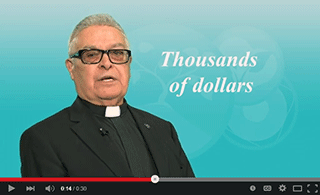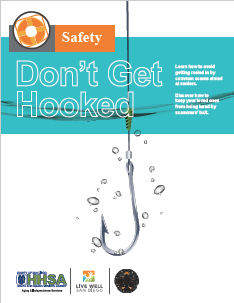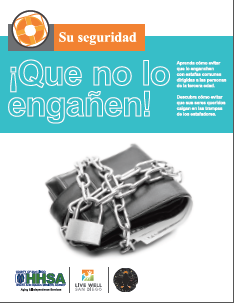

Older adults are the most susceptible to being scammed because they are the age group most often targeted. Many are vulnerable because they’re trusting. Sweepstakes mail, investment schemes, sales-pitch luncheons, grandparent-scam calls – once you turn a certain age, you are bombarded by thieves trying to trick you out of your hard-earned cash.
To avoid becoming a victim, older adults need to hang up, toss out, shut the door and ignore.


That isn’t always easy as the scammers try new tricks. But even if it’s not their nature, the Greatest Generation and Baby Boomers must become more suspicious and self-protective.
The County of San Diego Health and Human Services and District Attorney’s Office are teaming up to alert you to the various scams and fraud in our community and provide resources to help when trouble is knocking on the door.
Stop Scams Toolkit

This Stop Scams Toolkit offers information about common scams,
tips to avoid being a victim and important contacts to use to learn more or to help you if you are scammed.
 Please share this information with family and friends. Together, we can protect some of
our most vulnerable citizens and make San Diego County less lucrative for these con artists.
Please share this information with family and friends. Together, we can protect some of
our most vulnerable citizens and make San Diego County less lucrative for these con artists.
If you believe financial elder abuse has occurred, call Adult Protective Services at 1-800-339-4661.
Resources
Financial Fraud
Follow these steps if you think you’ve been a victim of any fraud that might put your finances at risk. This can include fraud related to health care/Medicare, health insurance, counterfeit prescription drugs, funeral and cemetery scams, fraudulent anti-aging products, telemarketers, Internet fraud, investment schemes, homeowner and reverse mortgage scams, sweepstakes and lottery scams, the Grandparent Scam, identity theft and legal documents.
Keep Calm and...
- Call your bank and/or credit card company.
- Cancel any debit or credit cards linked to the stolen account.
- Reset your personal identification number(s).
- File a report with the police.
- Contact Adult Protective Services, Elder & Dependent Adult Abuse Reporting Line: 1-800-339-4661
Medicare Scams
- Report suspicious activities to 1-800-MEDICARE
For more information about Medicare scams, visit:
www.cahealthadvocates.org/fraud
Identity Theft
- Contact your bank(s) and credit card companies immediately.
- Contact the Identity Theft Resource Center: 858-693-7935 and www.idtheftcenter.org
- File a report with the police. Companies you work with to clear up identity theft issues may want to see a copy of this report.
- File with the Federal Trade Commission by using its online complaint form at www.ftc.gov, or call the theft hotline at 1-877-ID-THEFT
- Contact the Social Security Fraud Hotline at 1-800-269-0271
-
Put out a fraud alert to the credit-reporting agencies:
-
Experian: 1-888-397-3742
(TDD 1-800-972-0322) -
Equifax: 1-888-766-0008
(TDD 1-800-255-0056 and request connection to Auto Disclosure Line at 1-800-685-1111) -
Transunion: 1-800-680-7289
(TDD 1-877-553-7803)
-
Experian: 1-888-397-3742
Internet Crime
-
FBI’s Internet Crime Complaint Center:
www.ic3.gov -
Protect yourself before becoming a victim:
- Sign up for the "Do Not Call" list at 1-888-382-1222 or www.donotcall.gov
- Sign up for the "Opt Out Mailing" list at 1-888-567-8688 or visit www.optoutprescreen.com
- Visit www.onguardonline.gov
Organizations with Resources on Scams and Fraud
-
Consumer Financial Protection Bureau:
www.consumerfinance.gov -
Consumer Federation of America:
www.consumerfed.org -
Elder Financial Protection Network:
www.bewiseonline.org -
FINRA Investor Education Foundation:
www.saveandinvest.org -
National Consumer League’s Fraud Center:
www.fraud.org -
National Senior Citizen’s Law Center:
www.nsclc.org -
Women’s Institute for Secure Retirement:
www.wiserwomen.org -
Aging & Independence Services: 1-800-339-4661
www.sandiego.networkofcare.org/aging - Adult Protective Services: 1-800-339-4661.br /> www.ais-sd.org
-
Long Term Care Ombudsman: 800-640-4661
Elder Law & Advocacy: 858-565-1392
www.ais-sd.org
Credit Bureaus
-
Experian: 1-888-397-3742
(TDD 1-800-972-0322)
www.experian.com -
Equifax: 1-888-766-0008
(TDD 1-800-255-0056 and request connection to Auto Disclosure Line at
1-800-685-1111)
www.equifax.com -
Transunion: 1-800-680-7289
(TDD 1-877-553-7803)
www.transunion.com -
Free Credit Report (all bureaus): 1-877-322-8228
www.annualcreditreport.com
Other Resources
-
Attorney General (San Diego County): 800-952-5548
www.caag.state.ca.us -
Bar Association (San Diego County): 619-231-0781
www.sdcba.org -
Better Business Bureau (San Diego): 858-496-2131
www.sandiego.bbb.org -
City Attorney (San Diego): 619-533-5500
www.sandiego.gov/cityattorney -
Consumer Product Safety Commission: 800-638-2772
www.cpsc.gov -
Contractors State License Board (California): 800-321-2752
www.cslb.ca.gov -
Dept. of Consumer Affairs (California): 800-952-5210
www.dca.ca.gov -
Dept. of Real Estate (California): 619-525-4192
www.dre.ca.gov -
Direct Marketing Association: 212-768-7277
www.dmaconsumers.org -
Direct Selling Association: 202-452-8866
www.dsa.org -
District Attorney (San Diego County): 619-531-4040
www.sdcda.org -
District Attorney Fraud Unit (San Diego County): 619-531-3507
www.sdcda.org - District Attorney Insurance Fraud Unit (San Diego County): 619-531-3749
- Do Not Call Registry: 888-382-1222
-
Federal Communications Commission (FCC): 888-225-5322
www.fcc.gov/complaints -
Federal Trade Commission (FTC): 877-382-4357
www.ftc.gov -
Federal Deposit Insurance Corporation (FDIC): 877-275-3342
www.fdic.gov -
Identity Theft Resource Center: 858-693-7935
www.idtheftcenter.org -
Opt Out (of credit card offers): 888-567-8688
www.optoutprescreen.com -
Phonebusters (report Canadian lotto scams): 888-495-8501
www.phonebusters.com -
Privacy Rights Clearing House: 619-298-3396
www.privacyrights.org
